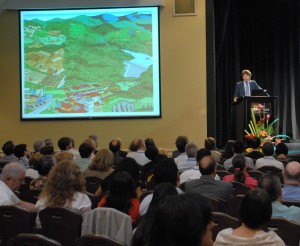Jose J Campos, Director General, CATIE, took centre stage once again giving an inspiring presentation entitled, “Climate smart territories- fostering production, resilience and reduced emissions through socially inclusive land management.” He opened by saying that it is important to think and to work on the territorial level. We should strive to optimize the goods and services in a territory, and to craft a vision with the different players in a territory. It is possible to diversify the economy and recover forest coverage, and noted that countries such as South Korea, and Finland are already doing so.
He stressed what is needed is collective actions from stakeholders; to give a positive result in a territory and ensure that we can improve our landscapes. He noted that this will take indigenous knowledge, new technologies, increased research and time, and it is important not to be spontaneous in how we approach the problems.
Key messages from his presentation include:
- Global challenges increasingly threaten human security; climate, food, water, energy, etc.
- System approaches (livelihoods, territorial, sustainable production and value chains) could effectively manage synergies and trade-offs among global challenges.
- There is a need for collective action through effective local governance and co-management of natural resources.
- “Climate smart technologies” are a tool that links top=down and bottom-up actions for collective impact.
He continued to explain that we do not need to reinvent the wheel. We need to find territories and existing projects to use as a model. He finished by saying that the key to this is in future professionals and in new interdisciplinary science. He stated there is a need to link students to ongoing development initiatives through fieldwork and case studies, to link their education to research, to local development processes and their contributions to society. If we work together we can create a virtuous circle for inclusive and sustainable human well-being.


Leave a Reply